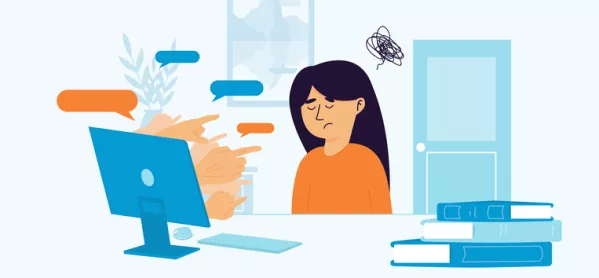The move to online teaching has been a fascinating one. I have dedicated many hours and Tes articles to explaining why I feel online platforms and remote learning are changing the face of education.
In less than a year, the well-established education dynamic, pedagogy and fabric of the intuition has been rewritten, leading to some fantastic innovation. Nevertheless, even with all those innovations, technology and the sheer determination of teachers, the fact remains, you cannot teach someone who does not want to learn.
We have all seen it in our classrooms, and it is an accepted fact that a child who does not want to engage will often begin to disrupt those around them, whether that be actively or not. For every fart noise, every inappropriate question, every insult, every rubber thrown across the classroom and impromptu play fight, there is a child who wants an audience and knows exactly how to get it.
Blended learning: Eight things students say work
Watch: Leaders talk about the return to college
International Women’s Day: Is there gender bias in work-based training?
For us teachers, it’s a headache - but it’s nothing a one-to-one chat, a call home to parents or a change to your seating plan can’t fix. But what happens when we remove consequences from disruptive behaviour? When a student can hide behind the anonymity of a screen and act, speak, and behave outside of social conditioning’s confines? Well, let me tell you, what you get is the perfect recipe for a troll.
Online learning: The danger of internet trolls
Trolls are no new thing: I’m sure that even as far back as the dawn of humanity, one caveman turned to another and said, “my cave is bigger than yours” (no euphemism intended). As human beings, we have an innate instinct to be competitive, leading to a culture of naming, shaming and faming - and the internet has merely been a conduit for this culture to thrive. Yet trolls take this culture one step further, intentionally and maliciously targeting individuals or events. Sadly, remote learning opened the door to the next generation of internet trolls.
YouTube, TikTok, and teacher message boards are awash with the mounting incidences that usually play out the same way. A teacher is delivering their lesson, and then, seemingly out of nowhere, it begins. Hiding behind a fake name, hacked email address or phoney account, they begin a Laurel and Hardy style routine using silly names or strange noises while the teacher struggles to kick them out of the session and regain control. An annoyance, no doubt, but nothing that would ruin your day. After all, you are a hardened teacher, and this story will become, in time, just another anecdote or teacher meme.
But then there are the other incidents: the ones that are not so innocent or light-hearted, and are actually pretty sinister. The ones where the teacher is delivering their lesson and then, from seemingly out of nowhere, a student begins what can only be described as a torrent of abuse, leaving both staff and students physically shaken. I have long said that empathy is a muscle that grows with life experiences and reflection. It takes time to develop the depth that empathy requires, and sadly there will always be those who act to disrupt and destroy, gaining their power from degrading and hurting others.
Yet, as every teacher will know, we are, at our core, problem solvers. We thrive in the face of diversity. We roll with the punches, and I know that, over the past year, there has been a lot of them.
Nevertheless, we show up, we move mountains, and we get the job done. And remember, adding a waiting room to your online lesson can prevent unwanted troll attacks.
Jennifer Wilkinson is a functional skills English lecturer at a college in England
